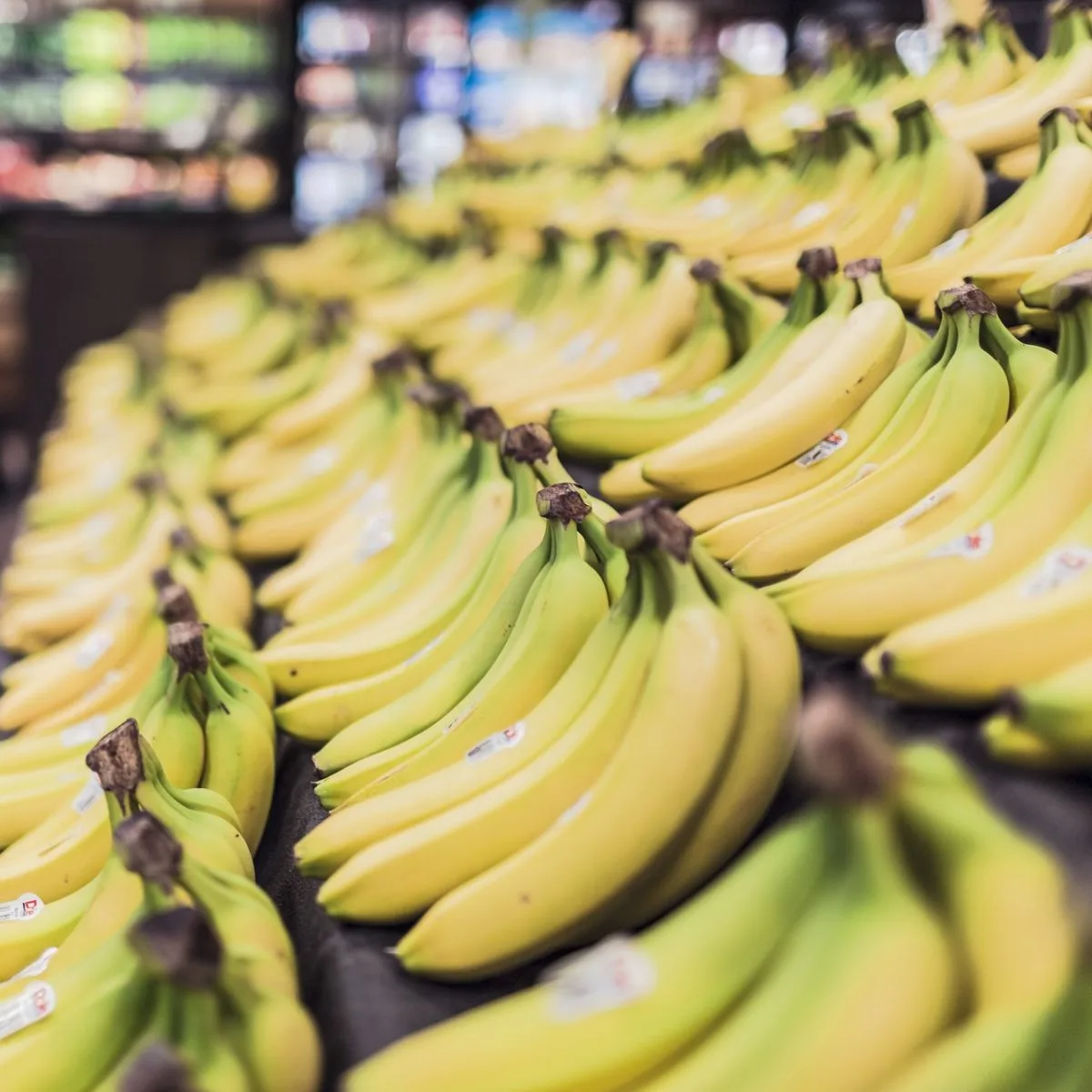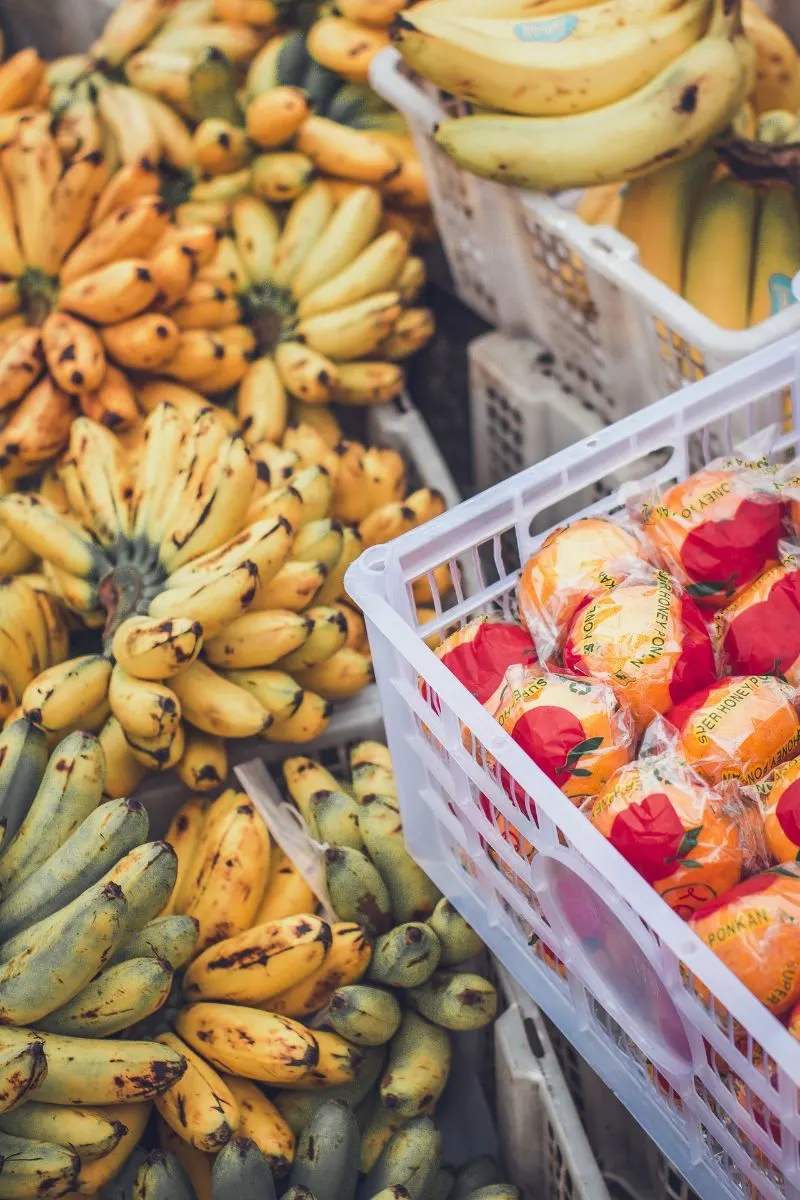Bananas are widely celebrated for their nutritional benefits and delicious taste, but like all foods, they can have potential side effects.
While these are generally rare and mild, it’s crucial to be aware of them, especially if you consume bananas frequently.
Potential Side Effects of Eating Too Many Bananas:
Gastrointestinal Issues: Bloating and Gas
Bananas, despite their reputation for being gentle on the stomach, can sometimes cause gastrointestinal discomfort in some individuals.
This usually happens due to the high fiber content and certain natural sugars found in bananas.
High Fiber Content
Bananas are rich in dietary fiber, which is beneficial for digestive health as it helps to regulate bowel movements. However, consuming too much fiber, especially suddenly, can lead to bloating, gas, and stomach cramps.
The fiber in bananas is primarily soluble fiber, which slows down digestion and can cause a feeling of fullness and bloating.
Natural Sugars and Fermentation
Bananas contain natural sugars such as fructose and glucose. In some people, these sugars can ferment in the gut, leading to the production of gas and subsequent bloating.
This is particularly true for those with fructose malabsorption, a condition where the body struggles to absorb fructose efficiently, leading to digestive distress.
Research Insights
A study published on the National Center for Biotechnology Information (NCBI) website examined the effects of dietary fiber on gastrointestinal health and concluded that while fiber is essential for health, excessive intake can cause bloating and gas in sensitive individuals. Therefore, moderation is key when it comes to consuming high-fiber foods like bananas.
Allergic Reactions
Although rare, some people can be allergic to bananas.
Banana allergies can range from mild to severe and can manifest in various ways.
Oral Allergy Syndrome (OAS)
One common form of banana allergy is Oral Allergy Syndrome (OAS).
This occurs when the immune system confuses proteins in bananas with pollen proteins, leading to an allergic reaction. Symptoms of OAS typically include itching or swelling of the mouth, lips, throat, and tongue.
Severe Allergic Reactions
In more severe cases, individuals can experience anaphylaxis, a potentially life-threatening reaction that requires immediate medical attention
Symptoms of anaphylaxis include difficulty breathing, swelling of the throat, and a drop in blood pressure.
Latex-Fruit Syndrome
Banana allergy is also linked to latex-fruit syndrome, where individuals allergic to latex may also react to bananas due to similar protein structures.
According to a study published by the NCBI, around 30-50% of individuals with latex allergies also react to certain fruits, including bananas.
Hyperkalemia: Too Much Potassium
Bananas are well-known for their high potassium content, which is essential for heart function, muscle contraction, and nerve signaling. However, excessive potassium intake can lead to hyperkalemia, a condition characterized by dangerously high levels of potassium in the blood.
Symptoms of Hyperkalemia
Hyperkalemia can cause a range of symptoms, from muscle weakness and fatigue to more severe issues, such as irregular heartbeats (arrhythmia), which can be life-threatening if not treated promptly.
Risk Factors
Individuals with kidney disease are particularly at risk, as their kidneys are less efficient at removing excess potassium from the blood. Certain medications, such as ACE inhibitors and potassium-sparing diuretics, can also increase the risk of hyperkalemia.
Clinical Evidence
A comprehensive review published on NCBI highlighted the risks of hyperkalemia associated with high dietary potassium intake, particularly in individuals with compromised kidney function. It’s important to monitor potassium intake and consult a healthcare provider if you’re at risk.
Tooth Decay
While bananas are a healthy snack, their natural sugars can contribute to tooth decay if proper oral hygiene is not maintained.
Sugar Content and Oral Health
Bananas contain natural sugars like fructose, glucose, and sucrose. When these sugars linger on the teeth, they can feed harmful bacteria in the mouth, leading to the production of acids that erode tooth enamel and cause cavities.
Sticky Texture
Bananas also have a relatively sticky texture, which means they can adhere to teeth and gums longer than less sticky foods. This can exacerbate the risk of tooth decay, especially if proper brushing and flossing are not practiced regularly.
Preventive Measures
To minimize the risk of tooth decay from bananas, it’s crucial to maintain good oral hygiene. Brushing and flossing regularly, especially after consuming sugary or sticky foods, can help protect your teeth. Drinking water after eating bananas can also help wash away residual sugars and acids.
Weight Gain Concerns
Bananas are often included in weight loss diets due to their low-calorie count and high fiber content. However, overconsumption can potentially lead to weight gain.
Caloric Intake
While bananas are not particularly high in calories, eating them in large quantities can contribute to a caloric surplus, which can lead to weight gain. A medium-sized banana contains approximately 105 calories. If you consume several bananas in addition to your regular meals, the calories can add up quickly.
Satiety and Cravings
Bananas have a high glycemic index (GI) compared to other fruits, meaning they can cause a rapid spike in blood sugar levels. This spike can be followed by a crash, leading to increased hunger and cravings for more food, potentially leading to overeating.
Balanced Diet
To avoid weight gain, it’s important to incorporate bananas into a balanced diet. Pairing bananas with protein or healthy fats can help stabilize blood sugar levels and keep you feeling full longer, preventing overeating.
Migraine Triggers
For some individuals, bananas can act as a trigger for migraines, a type of headache characterized by intense, throbbing pain often accompanied by nausea, vomiting, and sensitivity to light and sound.
Tyramine Content
Bananas contain tyramine, a naturally occurring compound that can trigger migraines in susceptible individuals. Tyramine is formed from the breakdown of the amino acid tyrosine and is found in various foods, including aged cheeses, cured meats, and certain fruits like bananas.
Sensitivity to Tyramine
Not everyone is sensitive to tyramine, but those who are may experience migraines after consuming bananas. The exact mechanism by which tyramine triggers migraines is not fully understood, but it is believed to involve the dilation and constriction of blood vessels in the brain.
Managing Triggers
If you are prone to migraines, it may be helpful to keep a food diary to identify and avoid potential triggers. Limiting or avoiding foods high in tyramine, including bananas, can help reduce the frequency and severity of migraines.
Blood Sugar Spikes
While bananas are a nutritious fruit, their impact on blood sugar levels can be a concern for individuals with diabetes or insulin resistance.
Glycemic Index and Load
Bananas have a moderate glycemic index (GI) of about 51, which means they can cause a moderate increase in blood sugar levels. The glycemic load (GL) of a banana, which takes into account the carbohydrate content, is about 13 for a medium-sized banana. This indicates that bananas can have a significant impact on blood sugar levels, especially if consumed in large quantities.
Insulin Response
The natural sugars in bananas, primarily glucose and fructose, can cause a rapid spike in blood sugar levels. This spike can trigger an insulin response, which helps lower blood sugar but can also lead to a subsequent drop, potentially causing feelings of hunger and fatigue.
Managing Blood Sugar
For individuals with diabetes or insulin resistance, it’s important to monitor carbohydrate intake and choose low-GI foods to help manage blood sugar levels. Pairing bananas with protein or healthy fats can help slow down the absorption of sugars and minimize blood sugar spikes.
Interaction with Medications
Bananas can interact with certain medications, potentially affecting their efficacy and leading to adverse effects.
ACE Inhibitors and Potassium
As mentioned earlier, bananas are high in potassium. Individuals taking ACE inhibitors, which are commonly prescribed for high blood pressure, need to be cautious with their potassium intake. ACE inhibitors can increase potassium levels in the blood, and consuming too many potassium-rich foods like bananas can lead to hyperkalemia.
Blood Thinners
Bananas contain small amounts of vitamin K, which is involved in blood clotting. For individuals taking blood thinners such as warfarin, maintaining consistent vitamin K intake is crucial. Although bananas are not particularly high in vitamin K, consuming large quantities could potentially affect blood clotting and the efficacy of the medication.
Monoamine Oxidase Inhibitors (MAOIs)
MAOIs are a class of antidepressants that can interact with tyramine-rich foods, including bananas. Consuming bananas while taking MAOIs can lead to a dangerous spike in blood pressure, known as a hypertensive crisis. Therefore, individuals on MAOIs should avoid or limit their intake of bananas.
Takeaway
While bananas are a nutritious and delicious fruit, they are not without their potential side effects. Being aware of these can help you make informed decisions about your diet and avoid any adverse reactions.
Remember, moderation is key, and it’s important to listen to your body and consult with healthcare professionals if you have any concerns.
Bananas can be a part of a healthy diet, but like all foods, they should be consumed mindfully and in balance with other nutrients.
